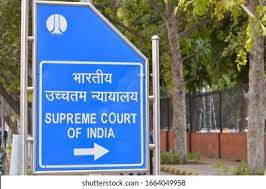The High Court upheld the judgment and order dated 30th March 2005, passed by the 1st Additional Sessions Judge, Shivpuri (Madhya Pradesh) (hereinafter referred to as the “trial court”) in Sessions Trial No. 09/2002, convicting the appellants and sentencing them to imprisonment for life for the offences punishable under Section 302 read with Section 149 of the Indian Penal Code, 1860 (Para 2)
No doubt that there are certain inconsistencies in the evidence of Chironji (PW-6) and Ramhet (PW-12). However, it is to be noted that the witnesses are rustic villagers and they cannot be expected to give minute details identical with each other. (Para 12)
Constitution Bench has held that it is not necessary that every person constituting an unlawful assembly must play an active role for convicting him with the aid of Section 149 of IPC. What has to be established by the prosecution is that a person has to be a member of an unlawful assembly, i.e. he has to be one of the persons constituting the assembly and that he had entertained the common object along with the other members of the assembly, as defined under Section 141 of IPC. As provided under Section 142 of IPC, whoever, being aware of facts which render any assembly an unlawful assembly, intentionally joins that assembly, or continues in it, is said to be a member of an unlawful assembly. (Para 14)
No doubt that there is no specific role attributed to the present appellants of assaulting the deceased Madan. However, since the appellants were members of the unlawful assembly, in view of the law laid down by this Court in the case of Masalti (supra), it is not necessary that such a person, for being convicted, must have actually assaulted the deceased. (Para 15)
Having held that, the question which we are left to answer is, as to, whether, the conviction under Section 302 of IPC would be tenable or not. (Para 16)
The defence taken by the appellants and the other accused persons was that in fact the accused persons had first lodged the complaint with regard to the attack made by the complainant party. It is their defence that after lodging the complaint, when they were coming back from the Police Station, the complainant party had come on a tractor and assaulted the accused persons. It is their contention that the accused persons tried to save themselves. As a result whereof, there was a free fight resulting in injuries to the members of both the parties and unfortunately deceased Madan succumbing to the injuries. (Para 17)
The omission on the part of the prosecution to explain the injuries on the person of the accused assumes much greater importance where the evidence consists of interested or inimical witnesses or where the defence gives a version which competes in probability with that of the prosecution one. In the instant case, when it is held, as it must be, that the appellant Dasrath Singh received serious injuries which have not been explained by the prosecution, then it will be difficult for the court to rely on the evidence of PWs 1 to 4 and 6, more particularly, when some of these witnesses have lied by stating that they did not see any injuries on the person of the accused. (Para 20)
Undisputedly, in the present case also, the witnesses are interested witnesses. The injuries sustained by three accused persons are not at all explained. The trial court and the High Court have not considered this aspect of the matter. (Para 22)
Non-explanation of injuries on the persons of the accused would create a doubt, as to, whether, the prosecution has brought on record the real genesis of the incident or not. Undisputedly, as observed hereinabove, a cross case was also registered against the complainant party for the injuries sustained by the accused persons. (Para 23)
The entire incident arose on account of the happening on a day prior to the day of occurrence of the present incident, i.e. the buffalo of the complainant party spoiling the taparia built by accused Jalim Singh. It is quite possible that the accused persons did not have an intention to cause death of anybody from the complainant party. It is possible that the accused persons only assembled to teach a lesson to the complainant party on account of the buffalo from their party damaging the taparia of the accused Jalim Singh. (Para 25)
We are therefore of the considered view that the appellants are entitled to benefit of doubt. The conviction under Section 302 IPC would not be sustainable. The prosecution has failed to prove beyond reasonable doubt that the unlawful assembly had an intention to cause the death of the deceased. As such, we find that the case would fall under Part-II of Section 304 of IPC. (Para 26)
In the result, the appeals are disposed of with the following directions:
(i) The conviction under Section 302 IPC is altered to Part-II of Section 304 of IPC;
(ii) The appellants are sentenced to suffer rigorous imprisonment for 7 years.
SUPREME COURT OF INDIA
2023 STPL(Web) 400 SC
[2023 INSC 973]
Parshuram Vs. State Of M.P.
Criminal Appeal No. 524 of 2021 With Criminal Appeal No. of 2023 [Arising Out of Slp (Crl.) No. 1718 of 2022]-Decided on 03-11-2023.
https://stpllaw.in/wp-content/uploads/2023/11/2023-STPLWeb-400-SC.pdf







